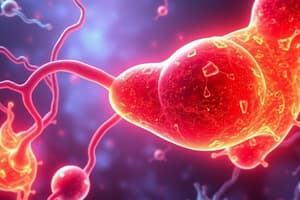Podcast
Questions and Answers
Which hormone is responsible for decreasing blood glucose levels?
Which hormone is responsible for decreasing blood glucose levels?
- Growth hormone
- Cortisol
- Glucagon
- Insulin (correct)
What is the primary source of energy for the body's cells?
What is the primary source of energy for the body's cells?
- Carbohydrates (correct)
- Lipids
- Fats
- Proteins
What is the term for a blood glucose concentration of 2.2 mmol/l (40 mg/dL)?
What is the term for a blood glucose concentration of 2.2 mmol/l (40 mg/dL)?
- Hypoglycemia (correct)
- Glycemia
- Normoglycemia
- Hyperglycemia
Which type of metabolic hormone increases blood glucose levels?
Which type of metabolic hormone increases blood glucose levels?
What is the main function of lipids in the body?
What is the main function of lipids in the body?
Flashcards are hidden until you start studying
Study Notes
Hormones and Blood Glucose Regulation
- Insulin is responsible for decreasing blood glucose levels.
- The primary source of energy for the body's cells is glucose.
Blood Glucose Concentration
- A blood glucose concentration of 2.2 mmol/l (40 mg/dL) is referred to as hypoglycemia.
Metabolic Hormones
- Glucagon is a type of metabolic hormone that increases blood glucose levels.
Lipids
- The main function of lipids in the body is to provide energy and insulation.
Studying That Suits You
Use AI to generate personalized quizzes and flashcards to suit your learning preferences.




